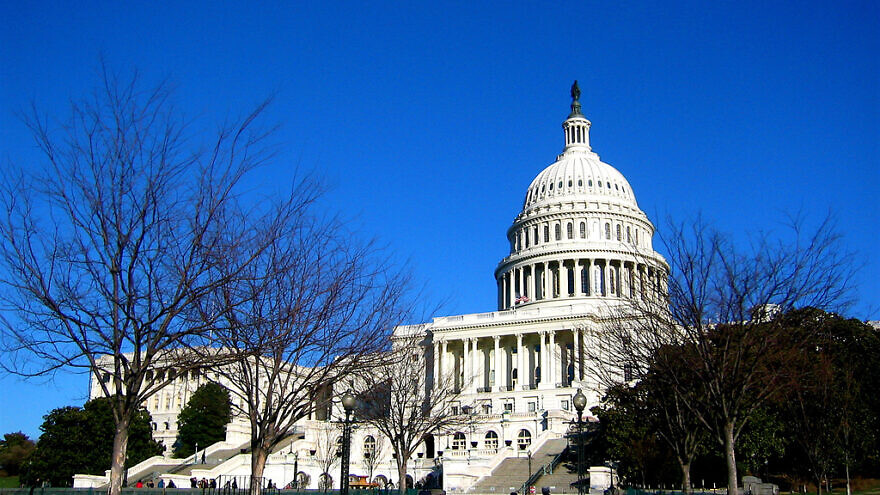Sitting on opposite sides of the ocean, David Wurmser in Washington D.C. and I in Jerusalem, both clasping our heads in dismay, contemplate the tragedy that occurred on Wednesday at Capitol Hill and the way in which U.S. President Donald Trump’s significant term in office was turned into a circus.
Wurmser—who served as Middle East adviser to former U.S. Vice President Dick Cheny, special assistant to John Bolton at the State Department and as a research fellow at the American Enterprise Institute—is among America’s leading conservative intellectuals.
Asked to describe the events of Jan. 13, Wurmser calls them “a disaster.”
“The entire history of Trump’s presidency will now be remembered primarily for this conclusion, and its legacy can be thoroughly compromised,” he says.
Wurmser continues: “Trump has always been like an antenna, able to read and be a faithful interpreter of the feelings of his base, certainly not a crowd of violent people, but of citizens accused of being like Nazis simply due to their not being on the left. Such a slur doesn’t allow for retort; it’s condemnation without appeal, because it implies total indecency.”
In addition, Wurmser notes, “For years, Trump and his supporters have been bombarded with accusations of ignominy. They have been fired from jobs; dismissed by family members; rejected by old friends; become the butt of hatred, disgust and shaming in the media; and suffered physical and verbal assaults at restaurants and on the street. Meanwhile, groups that in the last eight months have destroyed thousands of shops, injured citizens and shot policemen are given the mantle of legitimacy.”
According to Wurmser, the 2020 election campaign made all the above much worse.
“It wasn’t even really a campaign, but rather a chorus of defamation against the president and his backers, while those opposed to him were totally condoned—including those who committed violence and those who dismissed the relations of [President-elect] Joe Biden’s son, Hunter, with the Chinese.”
As for Trump’s continuing to claim victory on Nov. 3, even after it was clear that Biden was soon to occupy the Oval Office, which constituted a war cry to his base—a veiled request that it take power through strength—Wurmser answers: “Yes, in this he was wrong, even though there were certainly many problems with the vote count. But Trump has made several mistakes, such as his initial statements about the COVID-19 pandemic. While implementing the right policy, he proclaimed the wrong positions.”
In general, explains Wurmser, “his policies have led to the correction of many historical errors. These include: dismantling the paralyzing fear of China, undermining international obedience to the Palestinians’ continual rejectionism through peace accords between Israel and the Arab world; put an end to the foolish and dangerous claim that any agreement with Iran is better than no agreement; and canceled U.S. passivity in the face of anti-Israel hostility at the United Nations and in Europe. Where domestic policy is concerned, Trump promoted the rehabilitation of a very large and vilified social class, by promoting the rules of a free but nationalist market. Following this path, he gained more and more support over the years.”
Asked whether the current situation can be called a “catastrophe,” Wurmser refers to it as twofold—the first being the Capitol Hill clashes and fracturing of American democracy; the second surrounding the results of the Georgia Senate races.
“It’s a tragedy for Biden not to have a conservative Senate to hide behind in order to block the extremism that exists within his own party,” states Wurmser. “This will impose on him very bad choices in national and international politics.”
I ask Wurmser about the chances for healing American democracy and whether it will be possible to return to a situation in which the two major parties can both confront one another and work together peacefully.
“There has always been a large patriotic terrain in common between the two political parties in the country, particularly with regard to the idea that each individual is a repository of what our Constitution calls ‘inalienable rights,’ which have been bestowed upon him by God, history or nature—in short, by something greater than himself,” he explains. “But now, the [American] left has broken away from this premise, and it’s increasingly leaning towards a Bernie Sanders-style socialist drift.”
With the remaining days he has left in office, might Trump do something to shock the world yet again?
Wurmser doesn’t think so.
“Trump has abdicated U.S. interventionism, leaving everyone to his own troubles and choices. He has so also ended the political choice of a useless international ‘restraint.’ This is one of his several positive changes,” he says, adding a caveat.
“But,” he begins and I complete his sentence by adding, “He ruined everything.”
Wurmser tempers my language, concluding, “Let’s say ‘damaged.’”
Journalist Fiamma Nirenstein was a member of the Italian Parliament (2008-13), where she served as vice president of the Committee on Foreign Affairs in the Chamber of Deputies. She served in the Council of Europe in Strasbourg, and established and chaired the Committee for the Inquiry Into Anti-Semitism. A founding member of the international Friends of Israel Initiative, she has written 13 books, including “Israel Is Us” (2009). Currently, she is a fellow at the Jerusalem Center for Public Affairs.


























